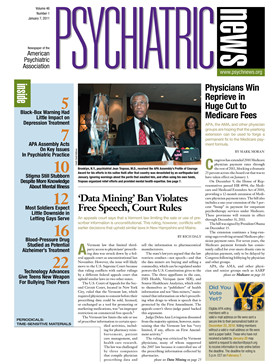This past November, the winds of political change blew across Washington, D.C., yet again. As we enter a new year and prepare for the start of a new Congress, this is a good time to talk about APAPAC, our political action committee, and ask you to contribute to support our vital efforts.
APAPAC is the political voice for APA on Capitol Hill and the only political voice dedicated solely to APA's legislative priorities. With broader support among APA members, we can continue to build on past legislative successes that APAPAC has been so instrumental in achieving. A stronger PAC means the ability to truly shape Congress with the most powerful supporters of psychiatry and the patients for whom we care.
APA's corporate reorganization as a 501(c)(6) entity a decade ago enabled it to invigorate its patient and professional advocacy activities by establishing a political action committee that allows APA, at the national level, to work for the election of members of Congress who share mutual principles and goals with APA and advocate for psychiatry's positions during the legislative process.
APAPAC also educates members of Congress about issues important to our patients and our profession. As APA members, we must work diligently to ensure that no laws and regulations are established that would negatively impact on our practice of psychiatry without the opportunity for prior education and comment from psychiatrists themselves.
APAPAC has been very successful at reaching both sides of the aisle and supporting members of and candidates for Congress regardless of party affiliation. Such nonpartisan support, at first blush, seems to dilute our targeted approach of helping legislators and candidates who are both knowledgeable about and sympathetic to mental health issues. However, as we have discovered, educating Republicans and Democrats alike about our issues can help reap significant legislative gains. For example, our victory on mental health care parity would not have been possible without support from our more moderate Republican friends in Congress.
In the last two-year cycle, APAPAC distributed $380,000 to candidates, 67 percent to Democrats and 33 percent to Republicans. APAPAC hosted or cohosted 95 congressional fundraising events. At each of these events was an APA member or member of APA's Department of Government Relations who had a one-on-one interaction with the candidate for whom the fundraiser was being held. Developing these relationships with senators, representatives, and their staff members is critical for gaining future access to members of Congress and engaging in meaningful dialogue about our issues.
In these recent congressional elections, we've seen firsthand the importance of our political involvement, which was made possible by the contributions of APA members. In the 2010 election, 85 percent of our supported candidates were elected. In 2008, that figure was an astounding 95 percent. Our PAC board, chaired by Dr. John Wernert from Indiana, has made a concerted effort to keep the leaders and influential members of both parties in our educated fold. For good reason—the 2010 state election results suggest how the future makeup of Congress may change.
We must keep the press on. In the Republican tide that swept the country in November, Republicans gained nearly 700 state legislative seats and took control of an additional 20 state chambers in 14 states. Republicans now hold nearly 3,900—or 53 percent—of all state legislative seats and control 54 of 99 state legislative chambers. This shift will significantly impact redistricting in the states and give the Republicans a distinct advantage in congressional races for the next 10 years. Our support of Republican members will be needed in legislative battles with respect to health care reform, implementation of parity, and scope-of-practice issues.
The 2012 elections will be another watershed. The GOP is poised to make further gains in the House and Senate. Will the Republican wave become larger, or will the Democrats regain their footing? Either way, APAPAC must be ready to play a major role in these crucial elections. The health reform fight will not end. APA, as the leader of organized psychiatry, must remain strong and engaged to ensure a stable future for our patients and our specialty.
It is vital that we all support this effort, and I encourage each of you to be a part of this process and contribute now. If each of our 34,000 members give $100, we will have the largest medical PAC in the United States.
Some APA colleagues have suggested that financial support of candidates is “seedy” and corrupts the political process. Though we have all had such thoughts at times, we also know that this is the political method necessary to elect legislators who support our issues and to gain access to members of Congress and their staffs so we can bring our messages to them.
As always, I welcome your thoughts and comments. You can contact me at
[email protected].


